Now that the summer has almost ended in India, the rainy season will be making its entry. This means the pomegranates will have better quality, and a color that is difficult to gain during the summer months. This is the time to export as many pomegranates as possible, as the December-to-March season now faces heavier competition than in the past.
Under normal circumstances the better quality pomegranates from India are available for about ten months of the year. During the two to three months lasting summer, the fruit doesn’t get the right color and getting the taste up to par is also a bit more challenging. Luckily the monsoon season just started, meaning busy times are ahead for Indian exporter Monsoon Green Earth (MGE) Farms. “The current season is mostly focused on the South East Asian market, as the Spanish have already started their season and the Turkish will start soon. This means the European market is saturated, and so we ship to any Asian country, via airfreight or sea.” Says Girish Sarda, who is the sales director for Monsoon Green Earth.
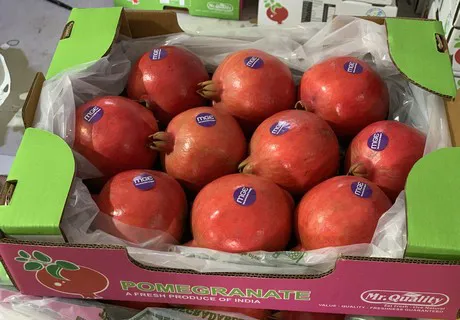
Even though Europe isn’t an interesting market at this time of the year, according to Sarda the European market was actually very important later in the season. “We used to be able to ship a lot of pomegranates to Europe during a four month window, which would last from December until the end of March. This isn’t the case nowadays, as the Turks delayed their season and the Peruvians started theirs slightly earlier. So our window only lasted for about three weeks last season. Starting in week 5 and already ending in week 8. This is a problem, especially as Indian volumes have increased a lot compared to a couple of years ago.”
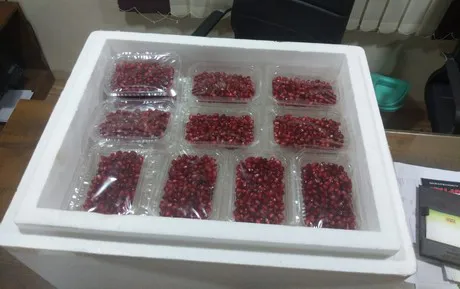
“We’re trying to get the Indian pomegranate back in demand, the only challenge we’re facing is the sizes. Although our pomegranates are nowhere near tiny, they are smaller in size than I have seen in other pomegranate producing countries,” says Sarda. So a new untapped market might be the way to go for the Indian pomegranate. “China could be an answer to our problems, as it’s a huge market and the Indian government is currently working on getting Indian pomegranates accepted in China. Our window perfectly suits their demand, well before and after Chinese New Year. This is actually the time the Indian pomegranates are of the best quality they can be, having great color on the inside and outside and a great brix level and good taste.”
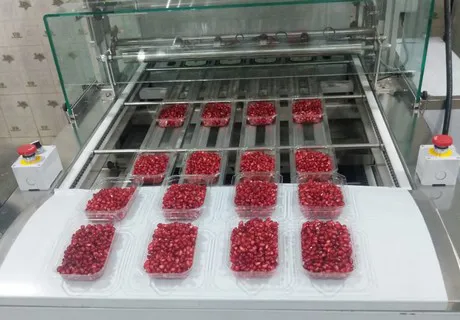
For the first time ever, this season MGE will also have a focus on pomegranate arils. To be able to process and pack the pomegranate arils, the exporter is leasing a facility: “This facility is located in Nashik and was actually constructed by one of our growers. We already have all the food safety compliance in place and also the BRC certification. This facility is leased out by MGE Farms for our production of 1.5 metric tons per day and will work exclusively for our packing program,” Sarda explains. “We can supply pomegranate arils in bulk, all twelve months of the year. We are focusing on Asian, Europe and other markets to build this new line for MGE. It should also help our growers to not sell their smaller sized fruit in the domestic market. Instead they can get a good price letting us process them into arils.”
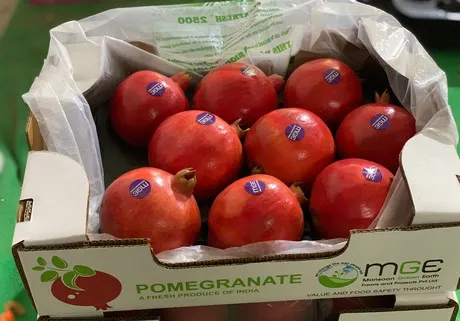
Even though the season can be a bit more challenging, MGE is determined to keep at it: “We will continue our Pomegranate export from August to April period. As India has one of the best quality and residue compliance pomegranate, it could give us more opportunities to cater to international markets. Our products are GGAP GRASP and Rainforest Alliance certified, MGE Farms is the only company who has RFA certified pomegranate in India. We were the first one in grapes, and now also in pomegranates.” Sarda concludes.
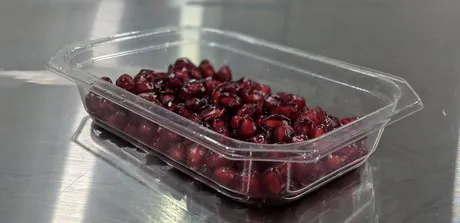
For more information:
Girish Sarda
Monsoon Green Earth Farms and Projects Pvt Ltd
Tel: +91 - 91 67 47 90 99
Email: girish.sarda@mgefarms.com
www.mgefarms.com
